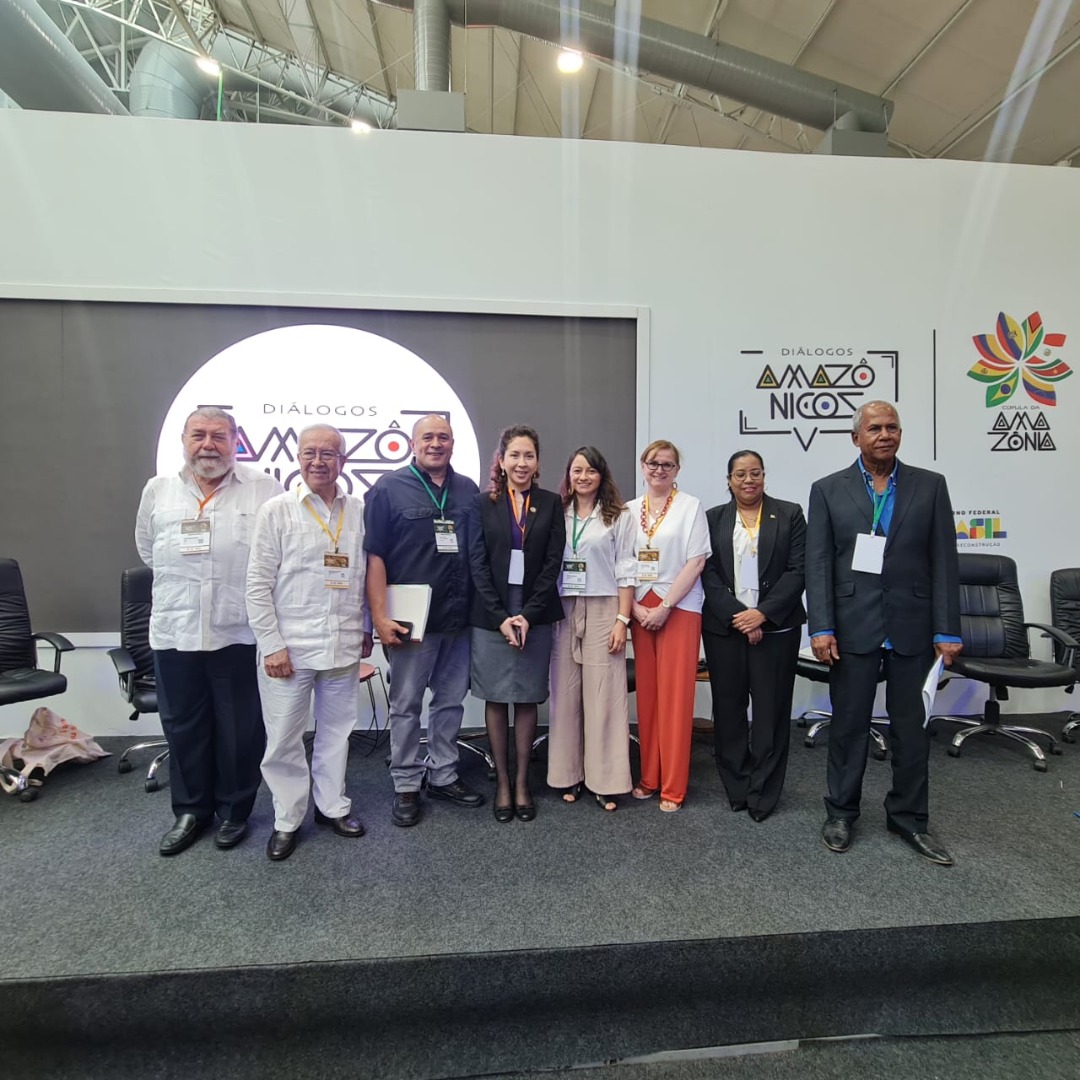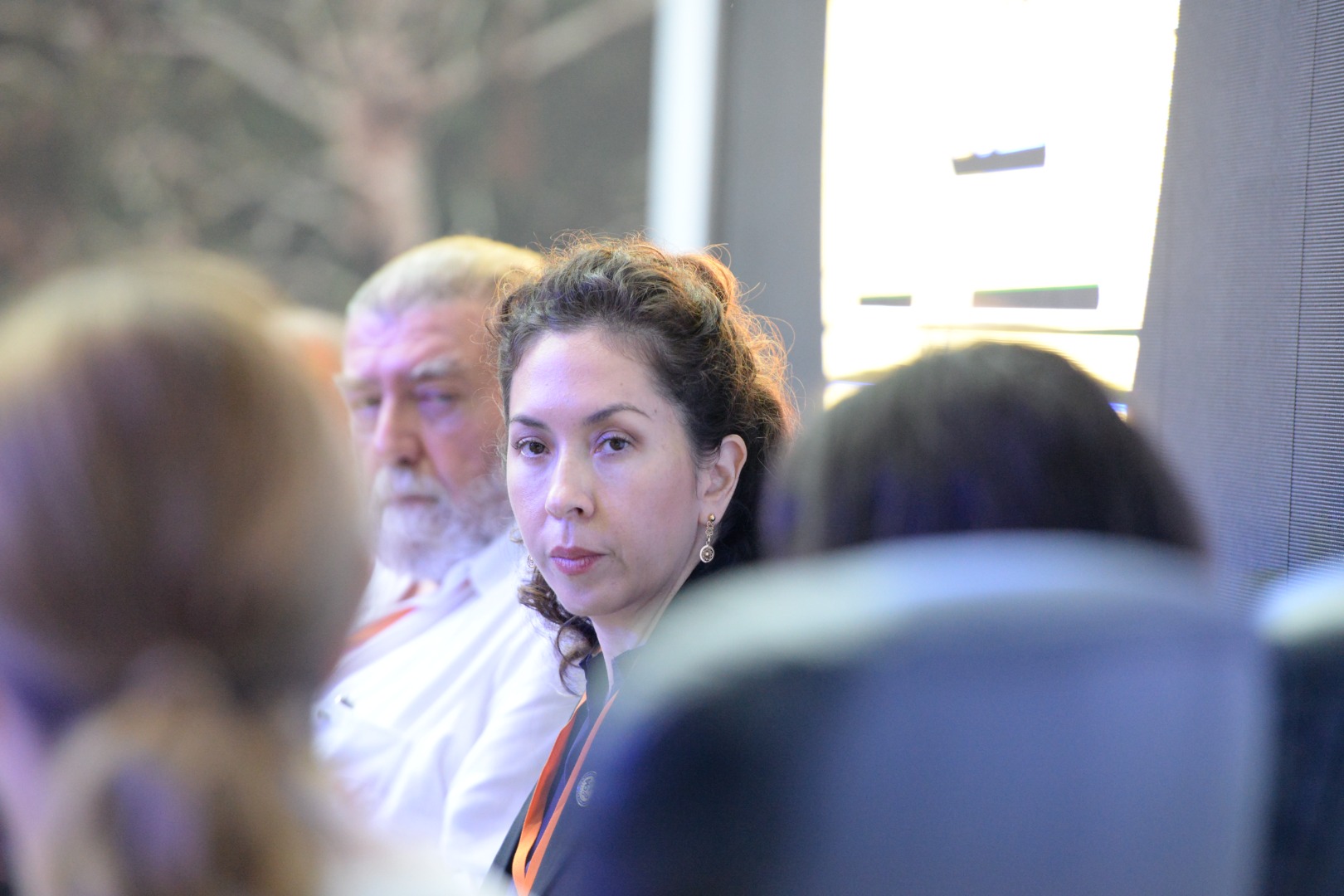Notícias
Event Organized by ABC Brought Together Representatives from Eight Countries and ACTO
 On Friday morning (08/04), Belém brought together representatives of the bodies responsible for international cooperation from the eight member countries of the Amazon Cooperation Treaty Organization (ACTO) to discuss strategies and priorities for making progress, through international cooperation, in efforts to contribute to the sustainable development of the Amazon region. Moderated by the Permanent Secretary of ACTO, Alexandra Moreira, the round table was organized by the Brazilian Cooperation Agency (ABC), of the Ministry of Foreign Affairs (MRE), and was among the panels that opened the Amazon Dialogues, which will take place until August 6, prior to the Amazon Summit (August 4-6), a space for broad dialogue that preceded the Summit of Heads of State of the Amazon (August 8-9).
On Friday morning (08/04), Belém brought together representatives of the bodies responsible for international cooperation from the eight member countries of the Amazon Cooperation Treaty Organization (ACTO) to discuss strategies and priorities for making progress, through international cooperation, in efforts to contribute to the sustainable development of the Amazon region. Moderated by the Permanent Secretary of ACTO, Alexandra Moreira, the round table was organized by the Brazilian Cooperation Agency (ABC), of the Ministry of Foreign Affairs (MRE), and was among the panels that opened the Amazon Dialogues, which will take place until August 6, prior to the Amazon Summit (August 4-6), a space for broad dialogue that preceded the Summit of Heads of State of the Amazon (August 8-9).
On the topic “ The future of International Cooperation for the Development of the Amazon Region ” , Participants from Brazil, Colombia, Ecuador, Guyana, Peru, Suriname and Venezuela presented different perspectives, common challenges and opportunities that exist and that could be boosted by the vision and implementation of coordinated cooperation at the regional level.
During the meeting, Alexandra Moreira stressed that the sustainable development of the Amazon needs to take into account cultural, social and economic aspects, as well as environmental issues. In talk show format, Alexandra led the dialog, alternating the floor between all the participants and taking questions from the audience in the last block, which had an audience of 250 people, including representatives from the government, civil society, universities and private companies.
With regard to what the priorities should be for advancing the process of sustainable development in the Amazon region in the coming years, ABC Director Ambassador Ruy Pereira highlighted issues common to the Agency's work, such as food and nutritional security and the various policies that contribute to its implementation, against the backdrop of the fight against hunger, as well as the need to fight illegal deforestation. The diplomat also mentioned innovative and necessary areas and perspectives for the sustainability of the Amazon rainforest: the bioeconomy and the conservation and protection of its genetic heritage.
Pereira mentioned the importance of including women, urban Amazonians and indigenous peoples in all debates on the future of the Amazon. "Of the 26 million people living in the Brazilian Amazon, 12 million are in cities with more than 100,000 inhabitants," he recalled. The ABC Director spoke about the undeniable impacts of an interconnected continent, recalling the words of President Lula: "What is done in one corner of South America has repercussions in another. That's why our cooperation is so important," he remarked.
 For Mónica Gonzalez, from the Colombian Presidential Agency for International Cooperation (APC-Colombia), the development of the Amazon will be greatly boosted by strengthening production chains that support local sustainable development. Ecuador's representative, Ambassador Isabel Albornoz, Undersecretary for Economic Affairs and Cooperation, stressed the importance of working towards a more harmonious vision regarding the use of natural resources from the Amazon region.
For Mónica Gonzalez, from the Colombian Presidential Agency for International Cooperation (APC-Colombia), the development of the Amazon will be greatly boosted by strengthening production chains that support local sustainable development. Ecuador's representative, Ambassador Isabel Albornoz, Undersecretary for Economic Affairs and Cooperation, stressed the importance of working towards a more harmonious vision regarding the use of natural resources from the Amazon region.
Candida Daniels, Director of the International Cooperation Department of the Ministry of Foreign Affairs and International Cooperation of Guyana, recalled that science and technology are fundamental aspects of sustainable development, and need to be integrated into any action in the region.
José Antonio Norris, Executive Director of the Peruvian Cooperation Agency (APCI), spoke about climate change and highlighted the need for reparations and the inclusion of indigenous peoples in international cooperation efforts. "We need an Amazon with a human face. We owe them a historic reparation," he said. For the Director of APCI, the Amazon countries should promote the strengthening of ACTO, as the only regional bloc that deals exclusively with the Amazon.
Radjindredath Narain, Policy Advisor at Suriname's Ministry of Spatial Planning and Environment, stressed the need to increase funding for scientific research related to climate change, the same aspect mentioned by Ali Peña, Vice President of the Venezuelan Geographic Institute Simón Bolívar. Peña stressed the importance of economic development that takes into account environmental protection and traditional communities.
In the second block of speeches, on the strategies to be adopted to promote sustainable development in the Amazon region, the director of ABC reiterated the importance of diversifying partnerships and implementing regional actions, such as those developed by ABC in conjunction with ACTO. The Brazilian diplomat highlighted an initiative already underway in the area of forests and said: "Standing forests have people with them; standing forests are not sanctuaries or reliquaries. And this reality, experienced every day by the peoples who depend directly on the living forest so that they can also live, this reality must be the basis and foundation of the future of international cooperation for the sustainable development of the Amazon, which, I recall, is the topic that summons us here today".
 The Colombian representative also stressed the importance of the Amazonian people's knowledge being respected and taken into account when drawing up actions to preserve the forests. Monica recalled that without the sustainable use of natural resources and decent living conditions for Amazonian populations, the region's sustainable development cannot be guaranteed. "We need to make the Amazon biome visible as a key element in solving the global climate crisis," she concluded.
The Colombian representative also stressed the importance of the Amazonian people's knowledge being respected and taken into account when drawing up actions to preserve the forests. Monica recalled that without the sustainable use of natural resources and decent living conditions for Amazonian populations, the region's sustainable development cannot be guaranteed. "We need to make the Amazon biome visible as a key element in solving the global climate crisis," she concluded.
For the Ecuadorian ambassador, "The environment does not recognize borders," said Isabel, who recalled the great potential for income generation that exists in promoting sustainable eco-tourism in the Amazon. She also stressed the need for the private sector to be included in efforts to promote sustainable development in the region. Candida, from Guyana, highlighted the importance and potential of South-South cooperation on issues such as the development of renewable energies. The representatives from Peru, Suriname and Venezuela also mentioned South-South cooperation as a powerful tool for exchanging knowledge and successful experiences.
After the final round of questions and answers, Ruy Pereira closed the event by reaffirming Brazil's commitment to continuing the dialogue started there, either by setting up a cooperation working group within the framework of ACTO, or by holding a new event similar to this one, on the sidelines of the Summit. "We need innovative mechanisms for the development of our region. Today, we are creating an indispensable verb: to Amazonize. We need to Amazonize everything, especially regional international cooperation between our countries," he concluded.